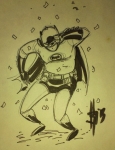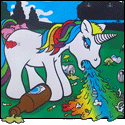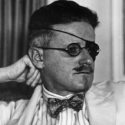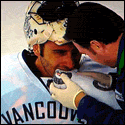|
Chillmatic posted:This thread's getting a bit anemic. Predicting the inevitable chorus of "Just write it, anything works if done well, blah blah." I feel like the inciting event, meaning the thing that sets the story in motion, is something that should have happened before the start of the novel, or that happens right at the outset. That doesn't mean that laying some groundwork before this happens isn't possible. It also doesn't mean that you can't have some kind of major catalyst that hits after an inciting incident occurs, raising the stakes of the inciting incident. But I think it's a good idea to have the inciting incident take place at the end of the first chapter at the latest. I think you can do this a million different ways, though. There are also many definitions of what, exactly, qualifies as an "inciting incident." A character can learn that her estranged father has died (inciting event), and travel to the family home to take care of the estate only to be assaulted by a burglar rummaging though the home's safe and discover that her father's death is more than it seemed (catalyst).
|
|
|
|

|
| # ? May 11, 2024 18:43 |
|
Chillmatic posted:This thread's getting a bit anemic. As I understand it, it's usually best to open as close to the inciting incident as possible for economy's sake, but what the gently caress do I know?
|
|
|
|
Chillmatic posted:
quote:As Gregor Samsa awoke one morning from uneasy dreams he found himself transformed in his bed into a monstrous vermin One of the best opening lines ever. And the rest of the book is fairly boring in terms of actual things happening, but you are squicked out and sucked in from that sentence onward. quote:Call me Ishmael. Some years ago - never mind how long precisely - having little or no money in my purse, and nothing particular to interest me on shore, I thought I would sail about a little and see the watery part of the world. It is a way I have of driving off the spleen, and regulating the circulation. Whenever I find myself growing grim about the mouth; whenever it is a damp, drizzly November in my soul; whenever I find myself involuntarily pausing before coffin warehouses, and bringing up the rear of every funeral I meet; and especially whenever my hypos get such an upper hand of me, that it requires a strong moral principle to prevent me from deliberately stepping into the street, and methodically knocking people's hats off - then, I account it high time to get to sea as soon as I can. Basically "I decided to get on a boat." You know something good is going to happen eventually. So it depends on your incident. Is the incident good enough to hook me for the whole book? Then open with it. Is promising the incident enough to hook me until you get there? Then make me wait.
|
|
|
|
Chillmatic posted:This thread's getting a bit anemic. I don't know about beginning a novel with the inciting incident but it should definitely begin with an inciting incident of some kind, even if it's small.
|
|
|
|
I suppose a big factor is if you want the incident to be something that affects the characters or the world around them. You can always start in media res, but that can be confusing as poo poo, unless that's the hook for your story (and even then, it can be handled badly *cough*malazan*cough*). Genre probably plays a role as mentioned, since the level of excitement/enticement you create at the start isn't always at the same level, depending on expectations or amount of setup. One of my half-finished things starts with a guy waking up late for work, but the first story incident doesn't happen until the end of the chapter, even though I've tried moving it around.
|
|
|
|
I'd say, an opening scene should raise questions in the reader's mind, which he will then attempt to satisfy by reading more. So, if I were to begin with an inciting incident, my tendency would be to include elements in that incident that will strike the reader as unusual, surprising, or unexpected, because it is curiosity which will drive the reader forward, until empathy for the characters takes root.
|
|
|
I don't really have any education in creative writing, but I have always really enjoyed it. Would this be the thread to post a short story for advice on my writing style etc? I sometimes have problems staying in tense and perspective, and I would just like some criticism and advice on a short story I wrote recently. If this isn't the right thread would anyone be able to point me in the right direction? Thanks in advance 
|
|
|
|
|
Sid Vicious posted:I sometimes have problems staying in tense and perspective, and I would just like some criticism and advice on a short story I wrote recently. How long is the story? Under 1000 words, post it at the Fiction Farm, your local hub for short shorts. Above 1000 words, you're going to have to make your own thread.
|
|
|
toanoradian posted:How long is the story? Under 1000 words, post it at the Fiction Farm, your local hub for short shorts. Above 1000 words, you're going to have to make your own thread. Awesome thanks for the link, apparently its 902 words long, so Fiction Farm sounds like the place for me!
|
|
|
|
|
Sid Vicious posted:I don't really have any education in creative writing, but I have always really enjoyed it. Would this be the thread to post a short story for advice on my writing style etc? I sometimes have problems staying in tense and perspective, and I would just like some criticism and advice on a short story I wrote recently. If this isn't the right thread would anyone be able to point me in the right direction? Thanks in advance You should definitely start doing weekly entries to the Thunderdome. You'll get really good/honest crit and fun prompts.
|
|
|
|
systran posted:You should definitely start doing weekly entries to the Thunderdome. You'll get really good/honest crit and fun prompts.
|
|
|
|
The thunderdome never has been, and God-willing, never will be a good place for anything. You'll be mocked but everyone is. It's just a place to practice writing and have some fun. So, yeah, I'd say hop in and enjoy yourself. If you lose--oh well. It's not a big deal to anyone. The only thing that people genuinely hate is when you write something gross that isn't even an attempt at being funny.
|
|
|
|
I went in as a complete beginner and got myself this avatar, coming in dead last on my first try. I also got very constructive feedback and the competitive aspect has kept me motivated to keep trying every single week. Not wanting to come in dead last again has made me write a rough draft the day the prompt comes out and then polish it as the week goes on. If you write something really bad, it will get torn to pieces, but they'll tell you why and you can fix it next time.
|
|
|
|
Thanks for the advice. I'm definitely going to be watching the prompts in the coming weeks with an eye toward entering.
|
|
|
|
With regards to the inciting incident- I usually think about it in terms of what's driving your story. Is it more action-driven or character-driven (or, because we have worldbuilders here, is it world-driven)? Personally, I'd say that if it's action-driven, then the inciting incident is the way to go. I'd have that incident and then introduce the people dealing with it. I'd stick mystery novels here (at least most of the ones I've read recently). With a character driven work, I still try to follow Vonnegut's advice and start as close to the end as possible. I don't know if that makes my work a tough sell, as it's not a pure, literary, slow ramble up to an event. I feel like that kind of approach lends itself too easily to falling into the trap of nothing happening for pages. I like LitFic a lot. But barring a few examples, I don't give a lot of time of day to stories that go nowhere in particular and are in no hurry to get there.
|
|
|
|
I think the inciting incident should happen very close to the start, but that doesn't mean your first paragraph must be your protagonist finding a body in their shower. I think it's okay to let the reader have a few minutes meeting the main character(s), but something interesting should happen before the end of the first chapter (and as close to the start as you can get it).
|
|
|
|
I would say go back and re-look at some of your favorite novels. You'll probably be surprised at how close to the start the inciting incident happens. Just grabbed a few books off of my shelf for quick and easy examples: The Gunslinger - Stephen King: Story opens in media-res with the protagonist already chasing the antagonist across a desert. Cat's Cradle - Kurt Vonnegut: It happens in on page 6 when narrator writes a letter one of Felix Hoenniker's (the fictional inventor of the atomic bomb in this story) children. This is Chapter 4, but Vonnegut's chapters are ridiculously short, some only a couple of paragraphs long. The Eye of the World - Robert Jordan: This one is a bit more complicated. One could argue that the inciting incident is in the first chapter when a mysterious figure follows the protagonist and his father as they travel from their farm into town for a festival. However, there are several chapters of more minor intrigue before the protagonist and his father return to their farm where they are attacked in chapter 5. However, in each chapter more and more mysterious and dangerous things happen that ramp up the feeling that this day is different from other days. Less than 24 hours pass in the timeline of the story before we have all hell breaking loose. American Gods - Neil Gaiman: The inciting incident happens during the first chapter, but it's 13 pages in when the Warden tells the protagonist that he's being released from prison early and why. Blackbirds - Chuck Wendig: The inciting incident happens in chapter 2, after a fairly short and intense first chapter where someone dies. I only have this on Kindle, so I can't count the page numbers. So, generally speaking genre writers at least seem to try to get as close to the start of the story as possible. Of course, it's possible (and probably likely in some of their cases) that this is done to meet the demands of editors. I will say that the ones that take longer to get around to it and (and honestly twelve pages isn't terribly long) are the same ones who tend to take a long time to get around to everything else. Vonnegut gets right down business, and I would say there isn't a wasted word in that whole book. It's the best written book of the group I sampled. Neil Gaiman takes his time a little more, but he pulls it off because his writing he his voice is pretty charming in this chapter, and he's telling these little prison anecdotes that are kind of funny, and kind of scary, and kind of cute. I think American Gods is an interesting case study because it's also very polarizing. Nerds tend to like it, but perhaps because it's so drawn out and at times self-servicing there is a somewhat vocal collection of people who think it's rubbish.
|
|
|
|
One of the most valuable pieces of writing advice I ever received was to start as close to the action as possible (or, in some cases, even after the inciting incident.) Sometimes I take this a little too far and my beta readers let me know that I need to start earlier to add context, but I'm a strong believer in throwing the reader into the ring at the start and revealing details of character, setting, etc., naturally through the narrative. As humans we're pretty good at picking up on context clues and it always feels a little insulting to me when a story wants to lead me by the hand through a character's mundane life (or, in genres like sci-fi or fantasy, a dry description of the world) before anything happens that I can get invested in.
|
|
|
|
The first thing the reader has to know, in most cases, is what business-as-usual looks like. Set up the everyday world, then let the Kool-Aid Man bust in.
|
|
|
|
|
Great Horny Toads! posted:The first thing the reader has to know, in most cases, is what business-as-usual looks like. Set up the everyday world, then let the Kool-Aid Man bust in. I don't really agree with this. I guess it depends on what kind of fiction you're writing (I don't write genre stuff, just "general" fiction), but a skilled writer can get these details across while things are actually happening in the story. I mean, you might not want to open with "Suddenly, to Steve's surprise, The Kool-Aid man burst the gently caress through the wall", but you don't need to spend several paragraphs going through Steve's morning routine before it happens, either.
|
|
|
|
Great Horny Toads! posted:The first thing the reader has to know, in most cases, is what business-as-usual looks like. Set up the everyday world, then let the Kool-Aid Man bust in.
|
|
|
|
squeegee posted:I don't really agree with this. I guess it depends on what kind of fiction you're writing (I don't write genre stuff, just "general" fiction), but a skilled writer can get these details across while things are actually happening in the story. I mean, you might not want to open with "Suddenly, to Steve's surprise, The Kool-Aid man burst the gently caress through the wall", but you don't need to spend several paragraphs going through Steve's morning routine before it happens, either. Samuel Goldwyn: "Start with an earthquake and work your way up to a climax!"
|
|
|
|
Great Horny Toads! posted:The first thing the reader has to know, in most cases, is what business-as-usual looks like. Set up the everyday world, then let the Kool-Aid Man bust in. Yes but only if the every day world isn't mundane. If it's yet another stupid grizzled detective story, then don't bother setting up the world because we all know what it looks like already. If it's some kind of sci-fi fantasy thing that people haven't seen a million times (like no dragons or spaceship bullshit) then I think you can take a small bit of time addressing the physics/rules/reality of the new space you've created. But it's a short leash and you have to at least make it engaging and part of the narrative/plot.
|
|
|
|
I don't recall where I read it, but some writing advice book told me, paraphrased, "The job of your first sentence is to get the reader to read the second sentence. The job of the second sentence, get them to the end of the paragraph. The second paragraph's job takes them to the end of the chapter, the chapter to the act, and the act through the book." I'm a believer in the strong opening. If you're not opening with the inciting event, open with a inciting event for a subplot that dovetails with your main story. Draw the reader's attention with something. Your first sentence or two should give the reader something to bite into, some interesting detail of character, setting or plot that drags them into reading the rest of your drivel. The first paragraph should expand on it, provide more interesting details. Keep doing this until you kick off your big plot, which is basically just another interesting thing, albeit the one your story hinges on.
|
|
|
|
Molly Bloom posted:With a character driven work, I still try to follow Vonnegut's advice and start as close to the end as possible. We shouldn't forget that among Vonnegut's other rules are "to hell with suspense, give the reader all the information as soon as you can" and "break almost any of these rules if you need to". For everybody's consideration, I'd like to throw in one of my favorite first lines, from A Prayer for Owen Meany. I am doomed to remember a boy with a wrecked voice – not because of his voice, or because he was the smallest person I ever knew, or even because he was the instrument of my mother’s death, but because he is the reason I believe in God; I am a Christian because of Owen Meany. Irving has a very long-winded, digressive narrative style in a lot of his stuff, but this is a great example of serving both masters. We get told the inciting incident and the conclusion of the story in the first sentence. We only get a hint of either, just enough to make you want to read on, but even that is enough to buy him a whole bunch of pages of character building before you get to the scene where the mother dies.
|
|
|
|
Molly Bloom posted:With a character driven work, I still try to follow Vonnegut's advice and start as close to the end as possible. I'd just like to point out for the record that the piece of Vonnegut's advice that you're referring to is specifically for short stories.
|
|
|
|
qntm posted:I'd just like to point out for the record that the piece of Vonnegut's advice that you're referring to is specifically for short stories. Yes, it is. Which is what I focus on. But I still think it's an acceptable thing to keep in mind for longer works, too.
|
|
|
|
Screenwriting advice tends to put the inciting incident at the end of act one, but there should be another to kick off the story right at the start. You need something to get your characters moving at the beginning, even if it's small. This doesn't mean you have to start in meda res. It means you give them something to do that will keep the reader interested and create opportunities to get to know the character without resorting to brushing teeth scenes. For example, say you start your story at a funeral, intending something to happen there that kicks off the mains story arc. This means someone had to die offscreen before the story starts to get all your characters to the opening funeral scene. That counts as an inciting incident, even though the main inciting incident (characters read the will, the body is missing, whatever) is yet to come.
|
|
|
|
Yeah, I like Erogenous Beef's way of putting it. The first sentence's job is to make the reader want to read the next, and the first paragraph's job is to get the reader into the second, etc. As others have said, it doesn't have to start with the major inciting incident of the story -though you certainly can- but you have to throw the reader some kind of bone. It helps to give the reader a reason to believe that you will be leading them to somewhere cool. If your prospective reader isn't familiar with your work and has no reason to trust you then you are selling yourself solely on the merit of your first few sentences. If they feel you are kinda meandering with too much world building or too much recounting of your protagonist eating some cheerios then they might feel that you are just wasting their time. It is easy to lose a reader before they even make it out of the first page. I really don't think this is a genre thing either. Hell, even with something like a non-fiction essay, it is good strategy to lead with the main point. The main point should be the reason you are writing the drat thing in the first place after all. Or if not that, at least lead with something interesting that will clearly hint at, and eventually lead to the main point before you start giving the background info and context that will support it. That stuff is probably going to be auxiliary anyways, important yes but not the meat of it. This can be applied to nearly any genre, literature, essay, movie, comic, puppet show or what have you. It certainly isn't the only way to do things(YMMV, Do whatever so long as it works, etc), but I think it is a good practice that helps more often then hurts in terms of keeping people's interest in your work.
|
|
|
|
Stuporstar posted:Screenwriting advice tends to put the inciting incident at the end of act one, but there should be another to kick off the story right at the start. You need something to get your characters moving at the beginning, even if it's small. This doesn't mean you have to start in meda res.
|
|
|
|
Mike Works posted:You're thinking of the first Plot Point (at the end of act one). The Inciting Incident comes with the first 10 pages/minutes. Right. I think a lot of people are getting the terms confused (including me), which is what kicked off the whole discussion in the first place. A lot of writing advice I've read uses the term inciting incident for the first plot point. The way you put it sets that straight, so I'll use that from now on. Thanks.
|
|
|
|
Yeah, it can be pretty loosey-goosey. I just wrote a 30 page screenplay where the inciting incident happens right before page 1. I think it works in that instance. Whereas for the two short fiction stories I've recently written, the first one doesn't have a true 'inciting incident' (it's more of a gradual build where different conflicts and problems pile on), and the second story's doesn't occur until the third page. The story I wrote before that one, the inciting incident happens in the second paragraph. So yeah, it really does vary from story to story. Here's a nice piece of advice when it comes to writing short fiction and trying to ascertain where to put your inciting incident: Don't write anything boring. That first sentence -> second sentence, second sentence -> second paragraph thing is a pretty good ideology to follow. Hook em. Keep em hooked. Bam. Done.
|
|
|
|
Mike Works posted:
It can be hard to talk about writing in terms of rules and what not in any kind of general sense because this is pretty much the only important thing ever.
|
|
|
|
JuniperCake posted:It can be hard to talk about writing in terms of rules and what not in any kind of general sense because this is pretty much the only important thing ever. An even better lesson is to learn how to make boring things grand. Kafka's Meditations (http://en.wikipedia.org/wiki/Contemplation_(Kafka)) are some of the best examples I've read demonstrating this. This of course takes a ton of practice and being able to pay attention in real life to the little things that make everyday things memorable. Why did you remember the way that mother chastised her daughter but you don't remember how the Barrista smiled at you when she handed you that cup of coffee? Or, why does a windy field with high grass evoke deep emotions while two children chasing one another in a park is boring? This is mostly artsy fartsy bullshit but being able to pay attention to the right details is more important than being able to list all the details of a scene. \/\/\/\/\/ Pretty much. Everyone should read as much Kafka as possible. He wrote some beautiful prose and some creepy stories. HiddenGecko fucked around with this message at 21:18 on Mar 20, 2013 |
|
|
|
Quote from Kafka: "Everyone who retains the ability to recognize beauty will never get old".
|
|
|
|
Great Horny Toads! posted:The first thing the reader has to know, in most cases, is what business-as-usual looks like. Set up the everyday world, then let the Kool-Aid Man bust in. But how long should it take to set up business as usual? I would be for most situations you could set it up pretty darned quickly. I'm not even entirely convinced that the "business as usual" step is necessary. In Cat's Cradle, there is no time wasted on "business as usual". You realize that the narrator is a writer working on a biography. Okay, that's all we really need to know about him for this story to work, and so that's all we get. Vonnegut moves on and gets to the interesting stuff. That book could have opened with a scene where he's finishing his previous biography and feeling like it didn't go so well. Now he's motivated to do something better. He's going to go out and... Well, you see where I'm going? All he would be doing is stepping back from the story to tell us a bunch of poo poo that isn't important or interesting. Instead he jumps right to the interesting part. A letter to the son of the inventor of the atomic bomb. And when he gets a letter back. Oh, wow. The guy is a dwarf and his father was insane. Please.... Tell me more.
|
|
|
|
Great Horny Toads! posted:The first thing the reader has to know, in most cases, is what business-as-usual looks like. Set up the everyday world, then let the Kool-Aid Man bust in. Time for some rambling so bear with me. This is not necessarily bad advice it's just so general that it could apply to anything. The main question you have to ask yourself (really about any story/plot/theme element) is HOW DOES THIS SERVE THE STORY, sometimes you need to set up business as usual because it's so weird relative to your reader's perspective that jumping right in to the juicy stuff can confuse the reader more than entice them. After you've determined whether something serves the story you need to decide if it serves your audience. Did you properly set this up beforehand so it'll click for the reader 300 pages ahead? Or will they think you pulled it right out of your rear end? A good example of this is an innocuous character detail in Gene Wolfe's four part Book of the New Sun. in the course of 1500 hundred pages he mentions only twice, TWICE that the main character wears a hooded cloak with no shirt underneath as his every day dress. It's mentioned once in the first hundred pages and he doesn't mention it again till midway through book two. If you weren't paying attention to every sentence or glossed over it it would be reasonable to assume that the main character wears a shirt because everyone else around him does and is described as such. Suddenly having the detail dropped on you again pulls you right out of the story for a second as you replay all the previous encounters the character had sans shirt. It's a tiny detail, but it's something I wish he'd mentioned a few more times (this is pretty much my only bizarre complaint about the book too So to recap. Ask yourself if what you are writing serves the story. Cut if it doesn't or is added fluff or whatever. Then ask how it will serve the reader. Is that fluff you cut actually needed for the reader to understand something vital to the plot? Will they remember in book three that the main character doesn't wear a shirt if you fail to bring it up for 600 pages? Compromise and use good sense. And beta readers to test your edits of course. Just some stuff to keep in mind. And to make your generalism more useful to other writers.
|
|
|
|
I don't have a copy of The Hobbit or LOTR kicking around, but, if I remember correctly, Tolkien lets us know that hobbits are little, furry people who love them some comfort and stability before Gandalf comes knocking. We don't know much more, but a state is established before it's upset. That's what I was getting at. Since my last post, I've realized that my preference was showing. Starting that way is both how I tend to present stories, and how I like them to be presented. I also read a lot of fantasy, fairy tales, myths, and legends. They tend to follow that sort of presentation. Mundane settings aren't really all that familiar to me. I guess a brotha forgot that some stories don't have elves or minotaurs.  But are there any that have elvotaurs, the half-bull, half-elf monstrosities with really big, really pointy ear-horns for impaling adventurers? Anyway, a certain Toad needs to put greater effort into posting such things. Understood.
|
|
|
|
|
Great Horny Toads! posted:I don't have a copy of The Hobbit or LOTR kicking around, but, if I remember correctly, Tolkien lets us know that hobbits are little, furry people who love them some comfort and stability before Gandalf comes knocking. We don't know much more, but a state is established before it's upset. That's what I was getting at. Nah It's cool. But for the purposes of this thread understanding the context of LOTR is more important than the presentation. He was attempting to write a modern mythology for Britain. He wasn't writing for any audience except perhaps his editor and himself. And, as a learned scholar and linguistics professor of the highest degree, LOTR follows the "hero's journey" almost point for point. It's all about context and understanding why Tolkien wrote LOTR the way he did and how this leads to every derivative fantasy epic that followed after. It's written archaically and obtusely because he was getting inspiration from Greek, Norse, Medieval mythology and what have you. LOTR has to be read in that context to fully appreciate what Tolkien was doing. So my advice is branch out a bit and try to read things that don't follow the hero's journey point for point. Check out some Kafka, Poe, or Steinbeck (if you're feeling particularly colicky)  Here's an awful graphic depicting the hero's journey for those who are too lazy to Google it. HiddenGecko fucked around with this message at 06:36 on Mar 21, 2013 |
|
|
|

|
| # ? May 11, 2024 18:43 |
|
Well, if it's gonna be that kind of party, let's kick it like it's 1936. Lord Raglan's Hero Scale 1. Hero's mother is a royal virgin; 2. His father is a king, and 3. Often a near relative of his mother, but 4. The circumstances of his conception are unusual, and 5. He is also reputed to be the son of a god. 6. At birth an attempt is made, usually by his father or his maternal grand father to kill him, but 7. he is spirited away, and 8. Reared by foster -parents in a far country. 9. We are told nothing of his childhood, but 10. On reaching manhood he returns or goes to his future Kingdom. 11. After a victory over the king and/or a giant, dragon, or wild beast, 12. He marries a princess, often the daughter of his predecessor and 13. And becomes king. 14. For a time he reigns uneventfully and 15. Prescribes laws, but 16. Later he loses favor with the gods and/or his subjects, and 17. Is driven from the throne and city, after which 18. He meets with a mysterious death, 19. Often at the top of a hill, 20. His children, if any do not succeed him. 21. His body is not buried, but nevertheless 22. He has one or more holy sepulchres. Truby's 22 steps is the modern version that can be applied to mere mortals/kitchen appliances/black comedians in fatsuits.
|
|
|
|


























